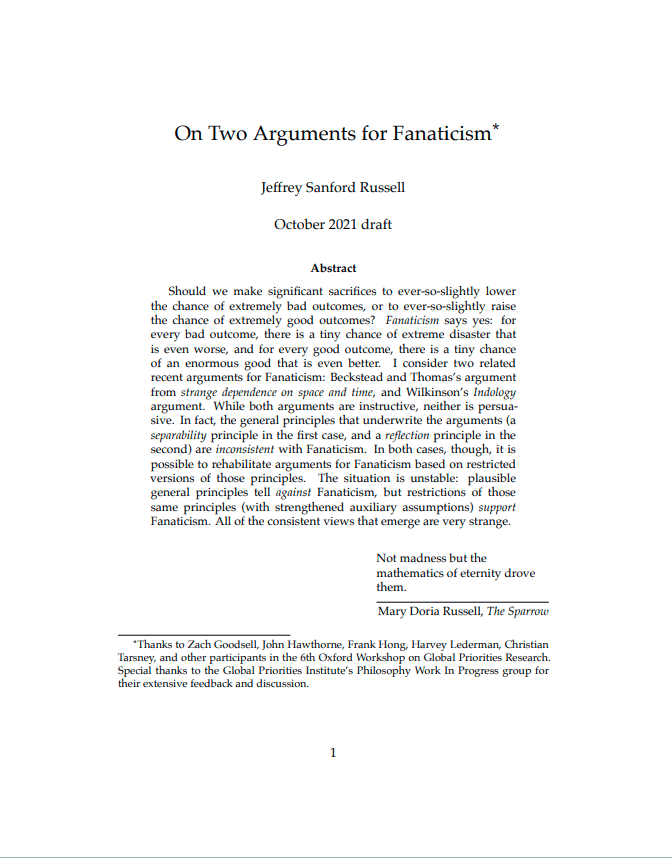On two arguments for Fanaticism
Jeffrey Sanford Russell (University of Southern California)
GPI Working Paper No. 17-2021, published in Noûs
Should we make significant sacrifices to ever-so-slightly lower the chance of extremely bad outcomes, or to ever-so-slightly raise the chance of extremely good outcomes? Fanaticism says yes: for every bad outcome, there is a tiny chance of extreme disaster that is even worse, and for every good outcome, there is a tiny chance of an enormous good that is even better. I consider two related recent arguments for Fanaticism: Beckstead and Thomas’s argument from strange dependence on space and time, and Wilkinson’s Indology argument. While both arguments are instructive, neither is persuasive. In fact, the general principles that underwrite the arguments (a separability principle in the first case, and a reflection principle in the second) are inconsistent with Fanaticism. In both cases, though, it is possible to rehabilitate arguments for Fanaticism based on restricted versions of those principles. The situation is unstable: plausible general principles tell against Fanaticism, but restrictions of those same principles (with strengthened auxiliary assumptions) support Fanaticism. All of the consistent views that emerge are very strange.
Other working papers
Against Willing Servitude: Autonomy in the Ethics of Advanced Artificial Intelligence – Adam Bales (Global Priorities Institute, University of Oxford)
Some people believe that advanced artificial intelligence systems (AIs) might, in the future, come to have moral status. Further, humans might be tempted to design such AIs that they serve us, carrying out tasks that make our lives better. This raises the question of whether designing AIs with moral status to be willing servants would problematically violate their autonomy. In this paper, I argue that it would in fact do so.
Crying wolf: Warning about societal risks can be reputationally risky – Lucius Caviola (Global Priorities Institute, University of Oxford) et al.
Society relies on expert warnings about large-scale risks like pandemics and natural disasters. Across ten studies (N = 5,342), we demonstrate people’s reluctance to warn about unlikely but large-scale risks because they are concerned about being blamed for being wrong. In particular, warners anticipate that if the risk doesn’t occur, they will be perceived as overly alarmist and responsible for wasting societal resources. This phenomenon appears in the context of natural, technological, and financial risks…
Meaning, medicine and merit – Andreas Mogensen (Global Priorities Institute, Oxford University)
Given the inevitability of scarcity, should public institutions ration healthcare resources so as to prioritize those who contribute more to society? Intuitively, we may feel that this would be somehow inegalitarian. I argue that the egalitarian objection to prioritizing treatment on the basis of patients’ usefulness to others is best thought…

